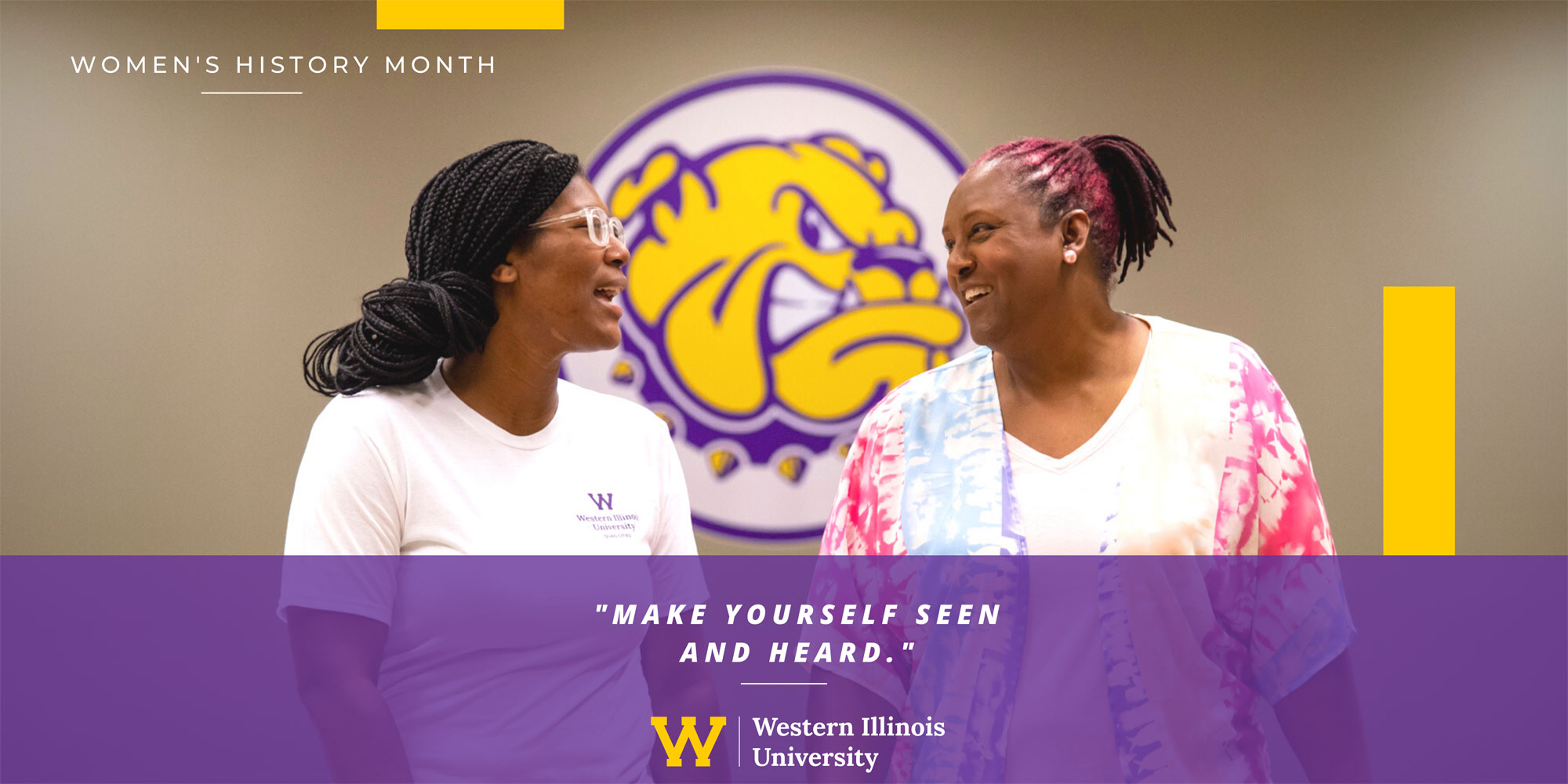Quad Cities Campus

March is Women's History Month
National Women's History Project
The 2024 theme is “Women Who Advocate for Equity, Diversity and Inclusion”
Library of Congress: Additional Information
Campus Events
WOMEN'S HISTORY MONTH ESSAY CONTEST
To celebrate Women's History Month, WIU-QC Student Services will be hosting an essay contest. The theme of the essay competition is "Celebrating Women Who Tell Our Stories." The minimum word requirement is 300; maximum word requirement is 1000.
The deadline for submission is March 22, 2024 at 4:00 p.m.
One winner will be selected on March 27, 2024.
Additional Websites
I am inspired by...

Angela Davis (1944- )
Angela Davis, radical black activist and philosopher from Birmingham, Alabama, was arrested as a suspected conspirator in the abortive attempt to free George Jackson from a courtroom in Marin County, California, August 7, 1970. She was eventually acquitted of all charges, but was briefly on the FBI's most-wanted list. Angela Davis is often associated with the Black Panthers and with the black power politics of the late 1960s and early 1970s. She joined the Communist Party when Martin Luther King was assassinated in 1968. She was active with SNCC (Student Nonviolent Coordinating Committee) before the Black Panthers. Angela Davis has been an activist and writer promoting women's rights and racial justice while pursuing her career as a philosopher and teacher at the University of Santa Cruz and San Francisco University—she achieved tenure at the University of California at Santa Cruz though former governor Ronald Reagan swore she would never teach again in the University of California system. She studied with political philosopher Herbert Marcuse. She has published on race, class, and gender.
Angela Davis is inspires me in the way that she has and continues to go against the grain and fight for those who cannot fight for themselves. The courage and tenacity she displays in the face of racism and oppression will serve as a model for activists for years to come.
Cameron Ruiz
Admissions Counselor

George Eliot (1819-1880)
Born Mary Anne Evans, George Eliot (1819-1880) was perhaps the greatest Victorian novelist, Charles Dickens being her closest rival. Unlike Dickens, however, Eliot in her tremendously influential (and long) novels offers a vision of humanity that is not only nuanced but resolutely liberal. I mean by liberal not the shallow partisan meaning slung around nowadays but the philosophical and political commitment to every individual person as a being of inviolable worth. Eliot's writing includes much more than this, however. Her novels feature characters who are fascinatingly complex, just like real people. Virginia Woolf rightly described Eliot's greatest novel, Middlemarch (1872) as "one of the few English novels written for grown-up people."
I first read that novel as a newly grown-up person, around 20, in college, and considered it then and ever since one of the finest portraits of what makes people tick, and also how people can change for the better. Writing at the very end of the novel of her protagonist, Dorothea Brooke, an immensely admirable person who nonetheless has her faults like the rest of us, the narrator describes "the effect of her being on those around her" as "incalculably diffusive" and then concludes that this is no small matter: "for the growing good of the world is partly dependent on unhistoric acts; and that things are not so ill with you and me as they might have been, is half owing to the number who lived faithfully a hidden life, and rest in unvisited tombs."
Dan Malachuk, Ph.D.
Department of English

Ruth Bader Ginsburg (1933-2020)
Ruth Bader Ginsburg was born and raised in Brooklyn, New York. After graduating from high school she attended Cornell University and graduated first in her class. She completed law school at Columbia University and graduated at the top of her class. With credentials like this, one would guess that Ruth Ginsburg would have no trouble getting a job at any law firm, but no firms would hire her. In a recent interview Justice Ginsburg explained “I had three strikes against me: one, I was Jewish, second I was female and the killer was, I was a mother.”
While she was not offered a job with a law firm, Justice Ginsberg was hired by Rutgers University and became the first female, tenured professor at that institution. While teaching, Justice Ginsburg did volunteer work at the American Civil Liberties Union where she co-founded the Women’s Right Project and the Women’s Rights Law Reporter, a journal that focuses exclusively on women’s rights. She spent years volunteering as a litigator and promoting gender-equality cases for both men and women. Her goal in litigating these cases was to show that discrimination is harmful to both genders.
Ruth Ginsburg’s legal talents and hard work earned her a judgeship with the United States Court of Appeals in 1980 and she was elevated to the U.S. Supreme Court in 1993. While considered a moderate when first appointed, Justice Ginsberg is now the senior justice of the liberal block of the Court.
Justice Ginsburg is an important figure in U.S. history as well as women’s history, but she is also a personal hero of mine. She blazed a path for all young women who wanted to become attorneys and showed me that it is possible to overcome gender discrimination. To me, Justice Ginsburg stands as a shining example of determination and judicial integrity.
C.Suzanne Bailey, J.D.
Associate Professor, School of Law Enforcement & Justice Administration

Connect with us: